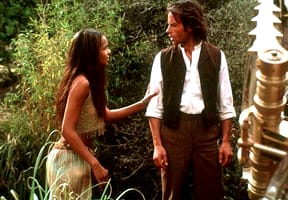The idea of "The Time Machine" current remake is actually a more interesting story than one would think - the director, an unknown newcomer named Simon Wells, is the great-grandson of "Time Machine" author H.G. Wells.
Originally adapted into a movie in 1960 by George Pal, "The Time Machine" is a frighteningly interesting look at the question "What if?" Set in New York City at the turn of the century (1899, that is), the film stars Guy Pearce as Alexander Hartdegan, a fidgety, time-obsessed professor. After a tragedy alters his life dramatically, Hartdegan explores a way in which he can go back and set things straight. Eventually constructing a machine that will travel through time, he leaves his world to see what he can do about the past, only to find out that things aren't that simple. Thinking he may have a chance in the future, Hartdegan travels to 2030, a world revolving around unfamiliar computer technology and then to 2037, where the Earth is being destroyed by debris falling from the sky (one of the film's more interesting ideas). Knocked out cold by the falling wreckage, he unconsciously travels into the future until he wakes up in the year 802,701.
Though the first half of the two versions of film are very different from each other, with the better story going to Pal, when both films flash 800,000 years forward, Wells' story and vision of the future succeeds as the victor. Both worlds are full of little knowledge of the past, but Pal's ideas were almost effortless, displaying a society of uncaring, superficial blonde inhabitants, known as Eloi, who don't work, don't worry and don't ask any questions. The fashion and architecture as well was very much similar to that of the 1960's, missing out on showing any outrageous artistic creativity that could of made the film more extraordinary. Wells on the other hand, shows the future as a primitive world relying on hunting and gathering skills, while living in tree forts on the side of cliffs. Terrorised by a race of monstrous cannibals known as Morlocks (who strike an uncanny resemblance to Iron Maiden's mascot Eddie), the Eloi are basically living until they are captured and taken to die.
Pearce as an actor does a great job as the nervous professor, but once he is put into the heroic role, going to combat against creatures twice his size, his character begins to become less realistic and more Hollywood. The ending isn't as captivating as the original, but also not necessarily going the way you would assume it would. And Jeremy Irons, yes he's in it, but only for about as long as it takes you to read this sentence, which is why he's hardly worth mentioning. Overall, The Time Machine is an exciting ride filled with plenty of rollercoaster rides and interesting futuristic ideas to make it worth seeing. But anyone looking for a scientific explanation as to how time travel works, try renting the original, because 2002's interpretation is all about thrills and chills, not egghead logic.
Originally adapted into a movie in 1960 by George Pal, "The Time Machine" is a frighteningly interesting look at the question "What if?" Set in New York City at the turn of the century (1899, that is), the film stars Guy Pearce as Alexander Hartdegan, a fidgety, time-obsessed professor. After a tragedy alters his life dramatically, Hartdegan explores a way in which he can go back and set things straight. Eventually constructing a machine that will travel through time, he leaves his world to see what he can do about the past, only to find out that things aren't that simple. Thinking he may have a chance in the future, Hartdegan travels to 2030, a world revolving around unfamiliar computer technology and then to 2037, where the Earth is being destroyed by debris falling from the sky (one of the film's more interesting ideas). Knocked out cold by the falling wreckage, he unconsciously travels into the future until he wakes up in the year 802,701.
Though the first half of the two versions of film are very different from each other, with the better story going to Pal, when both films flash 800,000 years forward, Wells' story and vision of the future succeeds as the victor. Both worlds are full of little knowledge of the past, but Pal's ideas were almost effortless, displaying a society of uncaring, superficial blonde inhabitants, known as Eloi, who don't work, don't worry and don't ask any questions. The fashion and architecture as well was very much similar to that of the 1960's, missing out on showing any outrageous artistic creativity that could of made the film more extraordinary. Wells on the other hand, shows the future as a primitive world relying on hunting and gathering skills, while living in tree forts on the side of cliffs. Terrorised by a race of monstrous cannibals known as Morlocks (who strike an uncanny resemblance to Iron Maiden's mascot Eddie), the Eloi are basically living until they are captured and taken to die.
Pearce as an actor does a great job as the nervous professor, but once he is put into the heroic role, going to combat against creatures twice his size, his character begins to become less realistic and more Hollywood. The ending isn't as captivating as the original, but also not necessarily going the way you would assume it would. And Jeremy Irons, yes he's in it, but only for about as long as it takes you to read this sentence, which is why he's hardly worth mentioning. Overall, The Time Machine is an exciting ride filled with plenty of rollercoaster rides and interesting futuristic ideas to make it worth seeing. But anyone looking for a scientific explanation as to how time travel works, try renting the original, because 2002's interpretation is all about thrills and chills, not egghead logic.
